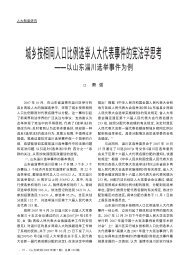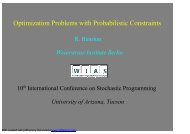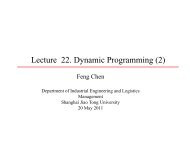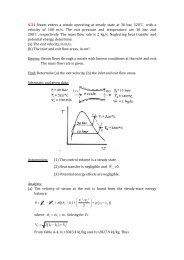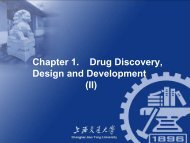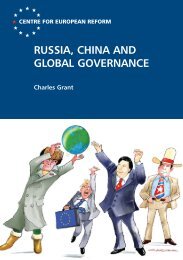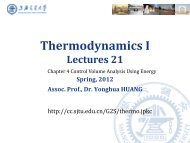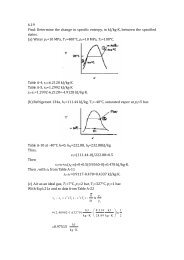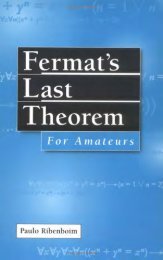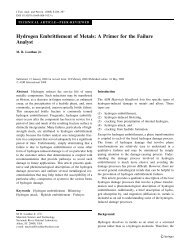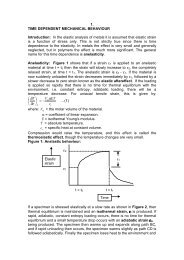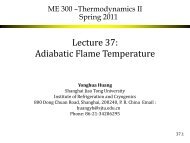The Making of the Apartheid Plan, 1929-1948* - CC
The Making of the Apartheid Plan, 1929-1948* - CC
The Making of the Apartheid Plan, 1929-1948* - CC
Create successful ePaper yourself
Turn your PDF publications into a flip-book with our unique Google optimized e-Paper software.
Journal <strong>of</strong> Sou<strong>the</strong>rn African Studies, Volume 29, Number 2, June 2003<br />
<strong>The</strong> <strong>Making</strong> <strong>of</strong> <strong>the</strong> Apar<strong>the</strong>id <strong>Plan</strong>,<br />
<strong>1929</strong>–<strong>1948*</strong><br />
HERMANN GILIOMEE<br />
(University <strong>of</strong> Stellenbosch)<br />
Downloaded by [Shanghai Jiaotong University] at 18:42 19 September 2012<br />
Apar<strong>the</strong>id as an ideology and operational plan for <strong>the</strong> Afrikaner nationalist movement was<br />
not, as <strong>the</strong> current orthodoxy suggests, <strong>the</strong> product <strong>of</strong> an Afrikaner Broederbond intelligentsia<br />
based in <strong>the</strong> Transvaal and affected by German romantic nationalism and Nazi<br />
racial thought. <strong>The</strong> main influences were German missiology, as applied by Dutch<br />
Reformed Church missionary strategists in <strong>the</strong> Orange Free State and, more importantly,<br />
<strong>the</strong> secular intelligentsia in <strong>the</strong> Western Cape with good access to D. F. Malan’s Cape<br />
National Party. Both <strong>the</strong> missionary strategists and Western Cape secular intellectuals were<br />
in <strong>the</strong> mainstream <strong>of</strong> <strong>the</strong> scholarship <strong>of</strong> racial thought and social engineering in Western<br />
Europe and <strong>the</strong> USA. <strong>The</strong> segregationist practice <strong>of</strong> <strong>the</strong> American South was particularly<br />
influential. <strong>The</strong> break with traditional South Africa segregation that apar<strong>the</strong>id represents<br />
was due mainly to party political competition between <strong>the</strong> National Party and United Party,<br />
obliging <strong>the</strong> former to come up with an alternative that was both more radical and more<br />
‘idealistic’, and to <strong>the</strong> polarisation <strong>of</strong> white politics after South Africa’s controversial entry<br />
into <strong>the</strong> Second World War. In essence, apar<strong>the</strong>id was a modernised form <strong>of</strong> both<br />
paternalism and trusteeship, on <strong>the</strong> one hand and, on <strong>the</strong> o<strong>the</strong>r, elements <strong>of</strong> liberal ideology<br />
not used by segregationists. <strong>The</strong> most sophisticated version, espoused first by N. P. van Wyk<br />
Louw and G. B. A. Gerdener, had a surprisingly enduring appeal.<br />
‘n Boer maak ‘n plan<br />
(Afrikaans proverb)<br />
Introduction<br />
For a concept that has dominated South African politics for <strong>the</strong> past 50 to 60 years, some<br />
aspects <strong>of</strong> apar<strong>the</strong>id have a remarkably obscure history. To start with <strong>the</strong> simple question:<br />
where and how did <strong>the</strong> term originate? Hexham records an early but eccentric use <strong>of</strong> <strong>the</strong><br />
term in Potchefstroom in 1905. 1 Davenport and Saunders accept <strong>the</strong> view <strong>of</strong> Nic Rhoodie<br />
that <strong>the</strong> term originated during <strong>the</strong> 1930s in <strong>the</strong> Transvaal and, more specifically, in <strong>the</strong><br />
political circles in which M. C. de Wet Nel, a later cabinet minister, moved. 2<br />
Both <strong>the</strong>se ascriptions ignore <strong>the</strong> much stronger claim <strong>of</strong> Rev. J. C. du Plessis that he<br />
was responsible for <strong>the</strong> first recorded use <strong>of</strong> <strong>the</strong> term in <strong>the</strong> sense that it became accepted<br />
in <strong>the</strong> 1940s. In <strong>1929</strong>, when a Dutch Reformed Church (DRC) pastor in Bethlehem in <strong>the</strong><br />
* Afirst draft <strong>of</strong> this paper was presented at <strong>the</strong> conference on ‘An Apar<strong>the</strong>id <strong>of</strong> Souls’, held at <strong>the</strong> London School<br />
<strong>of</strong> Economics in December 2000. <strong>The</strong> author thanks Richard Elphick and <strong>the</strong> JSAS referees for comments.<br />
1I.Hexham, <strong>The</strong> Irony <strong>of</strong> Apar<strong>the</strong>id (Toronto, Edward Mellen, 1981), p. 188.<br />
2R.Davenport and C. Saunders, South Africa: A Modern History (London, Macmillan, 2000), p. 373.<br />
ISSN 0305-7070 print; 1465-3893 online/03/020373-20 © 2003 Journal <strong>of</strong> Sou<strong>the</strong>rn African Studies<br />
DOI: 10.1080/0305707032000075876



